愚人节(April Fool's Day)英语完整课件
- 格式:ppt
- 大小:158.50 KB
- 文档页数:5
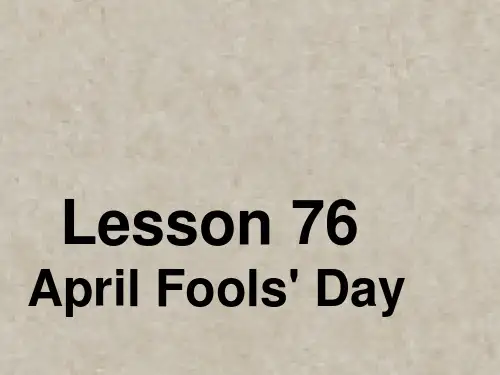
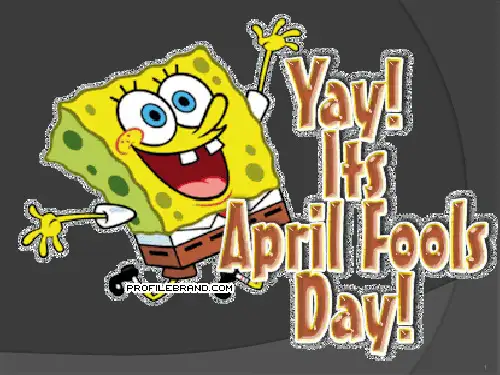
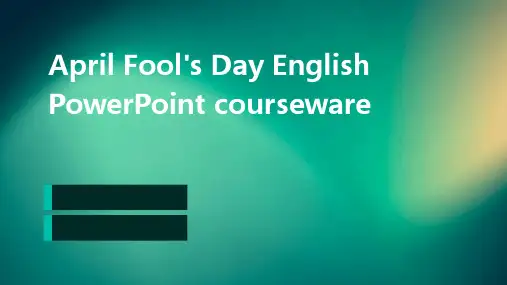
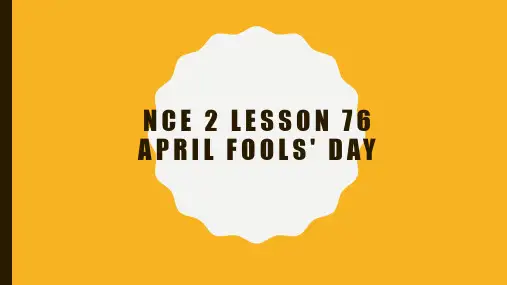
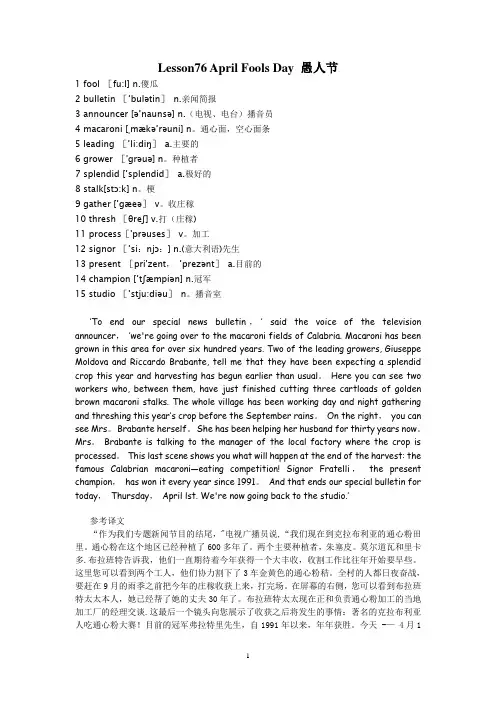
Lesson76 April Fools Day 愚人节1 fool [fu:l] n.傻瓜2 bulletin [’bulətin]n.亲闻简报3 announcer [ə’naunsə] n.(电视、电台)播音员4 macaroni [ˌmækə’rəuni] n。
通心面,空心面条5 leading [’li:diŋ]a.主要的6 grower ['grəuə] n。
种植者7 splendid [’splendid]a.极好的8 stalk[stɔ:k] n。
梗9 gather [’gæeə]v。
收庄稼10 thresh [θreʃ] v.打(庄稼)11 process['prəuses]v。
加工12 signor [’si:njɔ:] n.(意大利语)先生13 present [pri'zent,’prezənt]a.目前的14 champion [’tʃæmpiən] n.冠军15 studio [’stju:diəu]n。
播音室’To end our special news bulletin,’ said the voice of the television announcer,’we're going over to the macaroni fields of Calabria. Macaroni has been grown in this area for over six hundred years. Two of the leading growers, Giuseppe Moldova and Riccardo Brabante, tell me that they have been expecting a splendid crop this year and harvesting has begun earlier than usual。
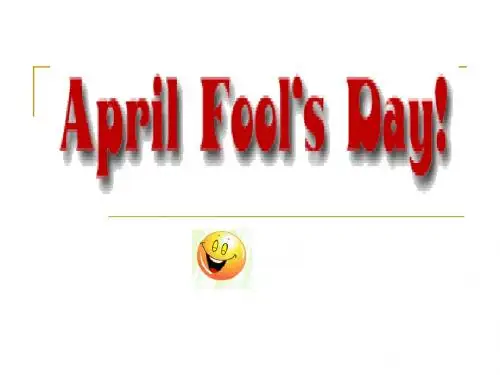
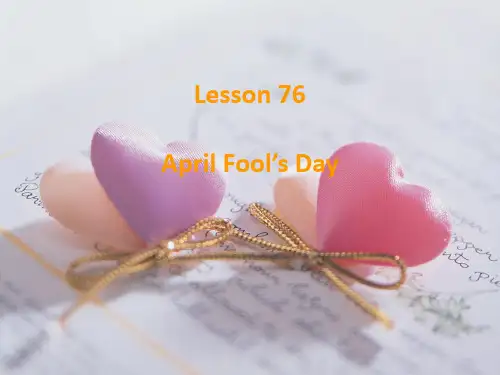
Lesson 76 April Fool’s Day•西方节日名称•1月1日新年(New Year's Day )•2月14日情人节(Valentine's Day)圣瓦伦丁节Saint Valentine's Day•复活节前的星期五耶稣受难日(Good Friday)•3月12日复活节(Easter)•复活节的下一个星期一复活节星期一(Easter Monday)•4月1日愚人节(April/All fool's day)•5月的第二个星期日母亲节(Mother's day)•6月的第三个星期日父亲节(Father's day)•9月的第一个星期一劳动节(Labor day)•10月31日万圣节前夕(halloween)•11月1日万圣节Hallowmas(All Saint's Day)•11月的第四个星期四感恩节(Tanksgiving day)•12月24日圣诞节前夕(Christmas Eve)平安夜fool n. 傻瓜•只有傻瓜才相信他能把纸变成钱。
.•Only a fool will believe he can turn paper to money.•谚语:[谚]愚人有钱留不住。
A fool and his money are soon parted [口]愚弄某人, 让某人出丑make a fool of sb[谚]愚人总喜强出头A foolalways rushes to the fore。
愚人节April Fool’s dayA fool may ask more questions in an hour than awise man can answer in seven years.[谚]聪明人也会被傻瓜难倒。
•相关表达:foolish adj.傻的•macaroni n. 通心面,空心面条••bulletin n. 新闻简报词组拓展:bulletin board system(BBS)电子布告栏系统记忆点拨:bullet(子弹)—in •announcer n.(电视、电台)播音员The announcer said that the contestants had been chosen at random.播音员说参赛选手是随机选出来的。

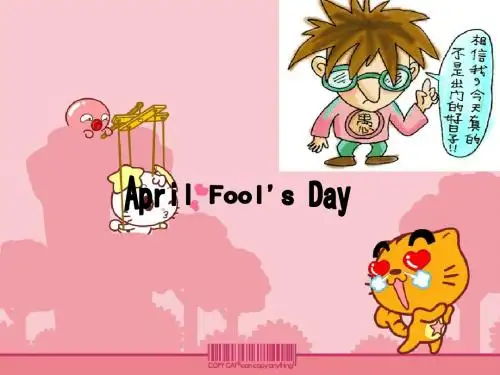

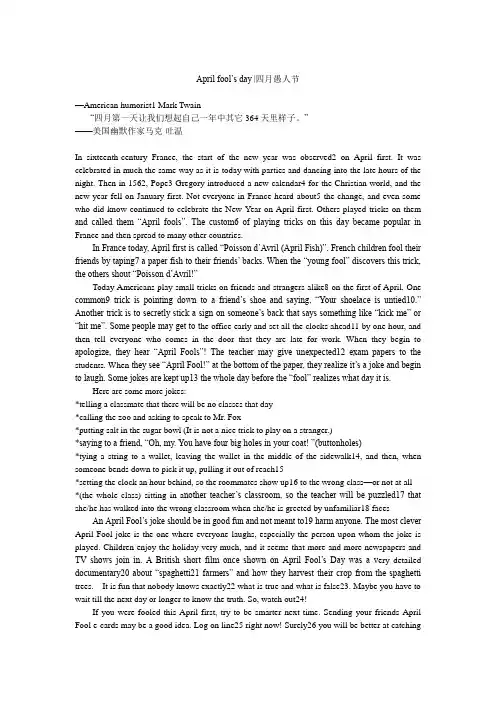
April fool’s day |四月愚人节—American humorist1 Mark Twain“四月第一天让我们想起自己一年中其它364天里样子。
”——美国幽默作家马克·吐温In sixteenth-century France, the start of the new year was observed2 on April first. It was celebrated in much the same way as it is today with parties and dancing into the late hours of the night. Then in 1562, Pope3 Gregory introduced a new calendar4 for the Christian world, and the new year fell on January first. Not everyone in France heard about5 the change, and even some who did know continued to celebrate the New Year on April first. Others played tricks on them and called them “April fools”. The custom6 of playing tricks on this day became popular in France and then spread to many other countries.In France today, April first is called “Poisson d’Avril (April Fish)”. French children fool their friends by taping7 a paper fish to their friends’ backs. When the “young fool” discovers this trick, the others shout “Poisson d’Avril!”Today Americans play small tricks on friends and strangers alike8 on the first of April. One common9 trick is pointing down to a friend’s shoe and saying, “Your shoelace is untied10.” Another trick is to secretly stick a sign on someone’s back that says something like “kick me” or “hit me”. Some people may get to t he office early and set all the clocks ahead11 by one hour, and then tell everyone who comes in the door that they are late for work. When they begin to apologize, they hear “April Fools”! The teacher may give unexpected12 exam papers to the students. When they see “April Fool!” at the bottom of the paper, they realize it’s a joke and begin to laugh. Some jokes are kept up13 the whole day before the “fool” realizes what day it is.Here are some more jokes:*telling a classmate that there will be no classes that day*calling the zoo and asking to speak to Mr. Fox*putting salt in the sugar bowl (It is not a nice trick to play on a stranger.)*saying to a friend, “Oh, my. You have four big holes in your coat! ”(buttonholes)*tying a string to a wallet, leaving the wallet in the middle of the sidewalk14, and then, when someone bends down to pick it up, pulling it out of reach15*setting the clock an hour behind, so the roommates show up16 to the wrong class—or not at all *(the whole class) sitting in a nother teacher’s classroom, so the teacher will be puzzled17 that she/he has walked into the wrong classroom when she/he is greeted by unfamiliar18 faces An April Fool’s joke should be in good fun and not meant to19 harm anyone. The most clever April Fool joke is the one where everyone laughs, especially the person upon whom the joke is played. Children enjoy the holiday very much, and it seems that more and more newspapers and TV shows join in. A British short film once shown on April Fool’s Day was a v ery detailed documentary20 about “spaghetti21 farmers” and how they harvest their crop from the spaghetti trees. It is fun that nobody knows exactly22 what is true and what is false23. Maybe you have to wait till the next day or longer to know the truth. So, watch out24!If you were fooled this April first, try to be smarter next time. Sending your friends April Fool e-cards may be a good idea. Log on line25 right now! Surely26 you will be better at catchingone fool or two next year.十六世纪法国,过新年是从四月一日开始。
愚人节(April Fool's Day 、April Fool's Day 或All Fools' Day )也称万愚节、幽默节,是西方社会民间传统节日,节期在每年4月1日。
愚人节与古罗马的嬉乐节和印度的欢悦节有相似之处。
在欧美一些国家,这一天,人们以多种方式开周围的人的玩笑,上当者当被告知是愚人节时,才恍然大悟,所以这一天总是能够引出许多笑话,不过某些玩笑也会因开得过大而引起人们的恐慌,或改变形势衍生成为(网络)谣言。
但是,玩笑最晚只能开到中午12点,这是约定俗成的严格规矩。
在愚人节的聚会上,还有一种做假菜的风俗。
有人曾经描述过一个典型的愚人节菜谱:先是一道“色拉”,莴苣叶上撒满了绿胡椒,但是把叶子揭开后,才发现下面原来是牡蛎鸡尾酒;第二道菜是"烤土豆",其实下面是甜面包屑和鲜蘑;此后上的菜还有用蟹肉作伪装的烧鸡和埋藏在西红柿色拉下面的覆盆子冰淇淋。
饭后,客人还可以从药丸盒里取食糖果。
愚人节这天玩笑只能开到中午12点之前,这是约定俗成的严格规矩。
过了中午还找乐子的人是一个比被他取笑的人还大的傻瓜。
过了钟点还开玩笑的人会立刻碰钉子,自找没趣儿。
有一首小诗是这样描述的:愚人节已过十二点,你这个大傻瓜来得晚。
待到来年愚人节,你将是最大个的大笨蛋。
又叫踏青节,在仲春与暮春之交,也就是冬至后的第108天,是中国传统节日之一,也是最重要的祭祀节日之一,是祭祖和扫墓的日子。
●踏青又叫春游。
古时叫探春、寻春等。
四月清明,春回大地,自然界到处呈现一派生机勃勃的景象,正是郊游的大好时光。
●放风筝也是清明时节人们所喜爱的活动。
每逢清明时节,人们不仅白天放,夜间也放。
夜里在风筝下或风稳拉线上挂上一串串彩色的小灯笼,像闪烁的明星,被称为“神灯”。
过去,有的人把风筝放上蓝天后,便剪断牵线,任凭清风把它们送往天涯海角,据说这样能除病消灾,给自己带来好运●清明节,插柳中国民间有插柳习俗。
四月一日英语April Fool's DayApril Fool's Day, also known as All Fools' Day, is an annual celebration observed on April 1st in many countries around the world. It is a day when people play practical jokes and hoaxes on one another, often with the intentionof surprising or amusing the recipient.The origins of April Fool's Day are not entirely clear, but it is believed to have roots dating back to the 16th century. One popular theory suggests that it originated in France when the Gregorian calendar was adopted, and the new year was moved from the end of March to January 1st. Those who continued to celebrate the new year on April 1st were mocked and labeled as "April fools."Another theory suggests that the tradition of playing pranks on April 1st may have its origins in the ancient Roman festival of Hilaria, which was celebrated at the endof March and involved masquerading and making fun of others. The modern-day April Fool's Day may have evolved from this ancient tradition.Regardless of its exact origins, April Fool's Day has become a widely celebrated tradition in many parts of the world. The day is marked by a wide range of practical jokes, hoaxes, and pranks, ranging from the harmless and playfulto the more elaborate and potentially harmful.One of the most well-known examples of an April Fool's Day prank was the BBC's 1957 "spaghetti tree" hoax, where the news organization reported that a family in Switzerland was enjoying a bountiful spaghetti harvest, complete with footage of people picking spaghetti from trees. Manyviewers believed the story, and the BBC received numerous inquiries from people asking how they could grow their own spaghetti trees.Another famous April Fool's Day prank was the TacoLiberty Bell hoax, in which Taco Bell took out a full-page advertisement in several major newspapers in 1996, announcing that they had purchased the Liberty Bell andwere renaming it the "Taco Liberty Bell." The prank causeda stir, with many people believing the story to be true, until Taco Bell later revealed it was all a joke.In recent years, the rise of the internet and social media has led to a proliferation of April Fool's Day pranks and hoaxes, with companies and individuals alike creating elaborate and often convincing fake news stories and social media posts to surprise and amuse their audience.Despite the fun and lighthearted nature of April Fool's Day, it is important to remember that some pranks can cross the line and cause harm or distress to others. It iscrucial to be mindful of the impact of one's actions and to ensure that any pranks or jokes are in good taste and do not cause undue harm or offense.Overall, April Fool's Day is a unique and lighthearted celebration that allows people to embrace their playful side and indulge in a bit of harmless mischief. Whetherit's a simple prank or an elaborate hoax, the day is a reminder to take life a little less seriously and to embrace the joy of surprise and laughter.四月一日四月一日,又称愚人节,是全世界许多国家每年都会庆祝的一个节日。